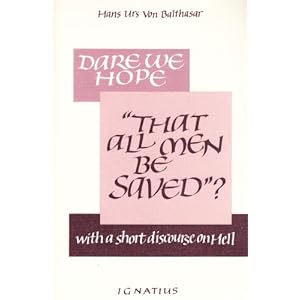Other posts on Love Wins:
Intro
Part 1--On Salvation
Part 2--On Heaven
--
A lot has been said about Rob Bell's view on hell. So much has been said it is hard for the common person hoping to get a summary of the issue to figure it all out. Even in the book itself, Bell is sometimes more concerned about telling stories and adding insights rather than a systematic argument.
In this post, I wanted to briefly cover what Rob Bell says about hell in his book (and what he doesn't say), why and how he makes these claims, and then give some resources what can help someone get a feel for the conversation around the issue. I'll give some Catholic perspective along the way as well.
What does Rob Bell say about hell?
There are many controversial aspects of the book, but the main one is this: Rob Bell makes the case that hell exists, but that it is only temporary (the majority of this argument comes in chapters 3 and 4). He believes that eventually everyone will be saved over time whether they accept the love of God in this life or the next. In Bell's words: "The love of God will melt every hard heart, and even the most 'depraved sinners' will eventually give up their resistance and turn to God." For Catholics, this is similar to what we believe about Purgatory, but Bell has transferred the concept to hell. (Catholics believe that everyone that goes to Purgatory eventually goes to heaven, but those in hell stay there--CCC 1030-1031).
Why and how does Rob Bell say this about hell?
Overall, Rob's main argument is the very character of God.
He asks questions pertaining to: Who is God? What does God want? Does God get what he wants?
Who is God?
Bell feels that the idea of hell puts God's character on the line. Bell states, "God is loving and kind and full of grace and mercy--unless there isn't confession and repentance and salvation in this lifetime, at which point God punishes forever. That's the Christian story, right?" In sum, Bell echos the modern question that many modern men and women have: How can a loving God send people to hell forever?
Bell uses much of Chapter three to make a Scriptural case for God to redeem mankind. Specifically, he points out God's punishment of Israel and other nations only to later redeem them. For instance, Jeremiah 32: "I will surely gather them from all the lands where I banish them in my furious anger and great wrath; I will bring them back to this place and let them live in safety." He also explores the meaning and concepts behind hell in the Bible. Specifically, he questions the words that we translate into eternal.
What does God want?
God's goal is to save all people. He shows a number of passages to back this up. Here are two:
"God wants all people to be saved and to come to a knowledge of the truth" (1 Timothy 2)
"Every knee should bow...and every tongue acknowledge that Jesus Christ is Lord" (Philippians 2).
Does God get what he wants?
Bell asks: "Does this magnificent, mighty, marvelous God fail in the end?"
Will "all the ends of the earth" come, as God has decided, or only some?...Will God shrug God-size shoulders and say 'You can't always get what you want?"
First Reaction
My first reaction is that Bell is asking some fantastic questions about God. And, I think it is important not to avoid them. We must applaude him for this even if we don't agree with everything he says. These are the questions of the modern man and woman. Addressing them helps to bring Christianity to the discussion table.
 Bell makes the point:
Bell makes the point:"Because if something is wrong with your God,
if your God is loving one second and cruel the next,
if your God will punish people for all of eternity for sins
committed in a few short years,
no amount of cleaver marketing
or compelling language
or good music
or great coffee
will be able to disguise
that one, true, glaring, untenable, unacceptable, awful reality."
Second Reaction
It is important to realize that Bell is speculating this opinion rather than saying that it is an absolute truth that he knows. In the book he says:
"Will everybody be saved, or will some perish apart from God forever because of their choice? Those are questions, or more accurately, those are tensions we are free to leave fully intact. We don't need to resolve them or answer them because we can't, and so we simply respect them, creating space for the freedom that love requires."
This quote shows that his overall argument is a lot more tame than most probably realize. I think this gets lost in the book and I think Bell could have done a better job of noting this. I think his overall goal is a conversation about the topic. But, in the end, I think most people are left with an argument because of the way that it is presented.
Third Reaction
What does the Catholic Church teach (and not teach) about this topic and what do I believe?
A few things:
1. Once in hell always in hell (CCC 1031)
2. We don't have to believe that anyone is in hell (We aren't God so we don't know).
3. We can hope that no one is.
Okay, so the Church teaches a lot more than this, but I won't cover everything here. It is funny because for all of Bell strong language, it seems like in the end he would agree with the Catholic theologian Hans Urs von Balthasar who would say we should hope that no one is in hell, but we don't know for sure (similar to Bell's quote above). Maybe, von Balthasar would have sold more copies if he had been able to make a trendy and controversial video and if he had lived in the era of twitter and blog controversy.
Bell is correct to point out all of the tensions. And, in the end, personally I feel left with tensions and not definitive answers.
I am satisfied with trusting in the justice of God for every human being. I think Bell's point is to shed light on the fact that modern men and women aren't.
Other Resources on Rob Bell's Book:
Fr. Robert Barron -- Catholic blogging priest
Darrell Bock -- Protestant Scripture scholar and editor of Christianity Today
Mark Discoll -- Popular Protestant pastor
--
What are your thoughts? Have you read the book? What opinion do you subscribe to?









